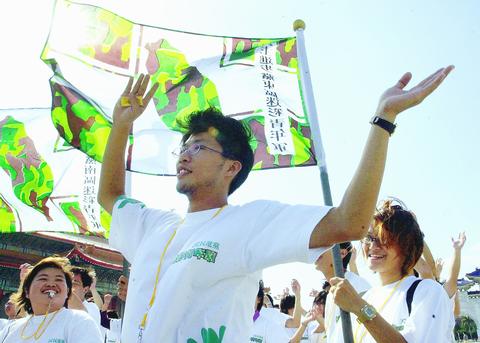The DPP's election campaign heated up yesterday afternoon as enthusiastic young members declared themselves devoted to the party during a campaign rally at the Chiang Kai-shek Memorial Hall.
The DPP's Youth Development Department launched the "DPP Youth Camouflage Corp" with the goal of promoting party candidates.

PHOTO: FANG PIN-CHAO, TAIPEI TIMES
The "camouflage corporation" was divided into four teams from northern, central, southern and eastern Taiwan. Team members consist of at least 200 students from more than 60 colleges nationwide. They call themselves "democracy protectors of generation `e'" (younger than generation X and better connected electronically) and will do whatever it takes to stop "black-gold" politics.
"The DPP is a young political party," said Wu Nai-jen (吳乃仁), the DPP secretary general. "We love to give young people chances and let them show their passion and enthusiasm for politics. We encourage the younger generation to give it a shot and participate in political activities instead of being afraid of making mistakes."
DPP staff members Hsiao Bi-khim (
The KMT launched a similar group of young people eight days ago called the "KMT Youth Corp" to campaign for the party. Unlike the DPP's rally yesterday, the KMT's young members campaigned on their scooters.
The DPP has nominated ten candidates to run for legislative seats in Taipei City constituencies.
The five candidates for the city's northern constituency are Luo Wen-chia (羅文嘉), the former vice chairman of the Council for Cultural Affairs; former National Assembly Representative Lan Shih-tsung (藍世聰) and incumbent legislators Wang Hsueh-feng (王雪峰), Lin Chung-mo (林重謨) and Cho Jung-tai (卓榮泰).
The five candidates for the southern constituency are Taipei City councilors Tuan Yi-kang (段宜康), Chou Po-ya (周柏雅) and Lan Mei-chin (藍美津); political analyst Julian Kuo (郭正亮) and incumbent lawmaker Shen Fu-hsiung (沈富雄).

MAKING WAVES: China’s maritime militia could become a nontraditional threat in war, clogging up shipping lanes to prevent US or Japanese intervention, a report said About 1,900 Chinese ships flying flags of convenience and fishing vessels that participated in China’s military exercises around Taiwan last month and in January last year have been listed for monitoring, Coast Guard Administration (CGA) Deputy Director-General Hsieh Ching-chin (謝慶欽) said yesterday. Following amendments to the Commercial Port Act (商港法) and the Law of Ships (船舶法) last month, the CGA can designate possible berthing areas or deny ports of call for vessels suspected of loitering around areas where undersea cables can be accessed, Oceans Affairs Council Minister Kuan Bi-ling (管碧玲) said. The list of suspected ships, originally 300, had risen to about

DAREDEVIL: Honnold said it had always been a dream of his to climb Taipei 101, while a Netflix producer said the skyscraper was ‘a real icon of this country’ US climber Alex Honnold yesterday took on Taiwan’s tallest building, becoming the first person to scale Taipei 101 without a rope, harness or safety net. Hundreds of spectators gathered at the base of the 101-story skyscraper to watch Honnold, 40, embark on his daredevil feat, which was also broadcast live on Netflix. Dressed in a red T-shirt and yellow custom-made climbing shoes, Honnold swiftly moved up the southeast face of the glass and steel building. At one point, he stepped onto a platform midway up to wave down at fans and onlookers who were taking photos. People watching from inside

Japan’s strategic alliance with the US would collapse if Tokyo were to turn away from a conflict in Taiwan, Japanese Prime Minister Sanae Takaichi said yesterday, but distanced herself from previous comments that suggested a possible military response in such an event. Takaichi expressed her latest views on a nationally broadcast TV program late on Monday, where an opposition party leader criticized her for igniting tensions with China with the earlier remarks. Ties between Japan and China have sunk to the worst level in years after Takaichi said in November that a hypothetical Chinese attack on Taiwan could bring about a Japanese

The WHO ignored early COVID-19 warnings from Taiwan, US Deputy Secretary of Health and Human Services Jim O’Neill said on Friday, as part of justification for Washington withdrawing from the global health body. US Secretary of State Marco Rubio on Thursday said that the US was pulling out of the UN agency, as it failed to fulfill its responsibilities during the COVID-19 pandemic. The WHO “ignored early COVID warnings from Taiwan in 2019 by pretending Taiwan did not exist, O’Neill wrote on X on Friday, Taiwan time. “It ignored rigorous science and promoted lockdowns.” The US will “continue international coordination on infectious